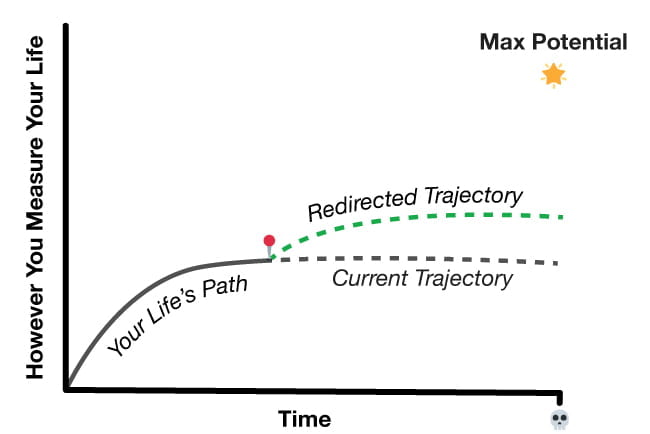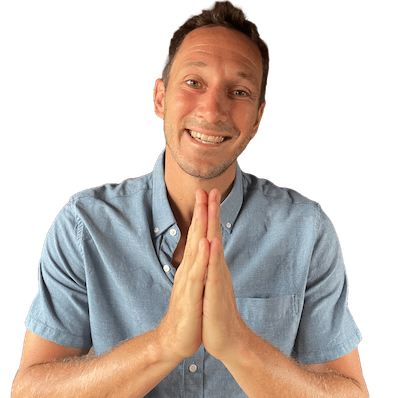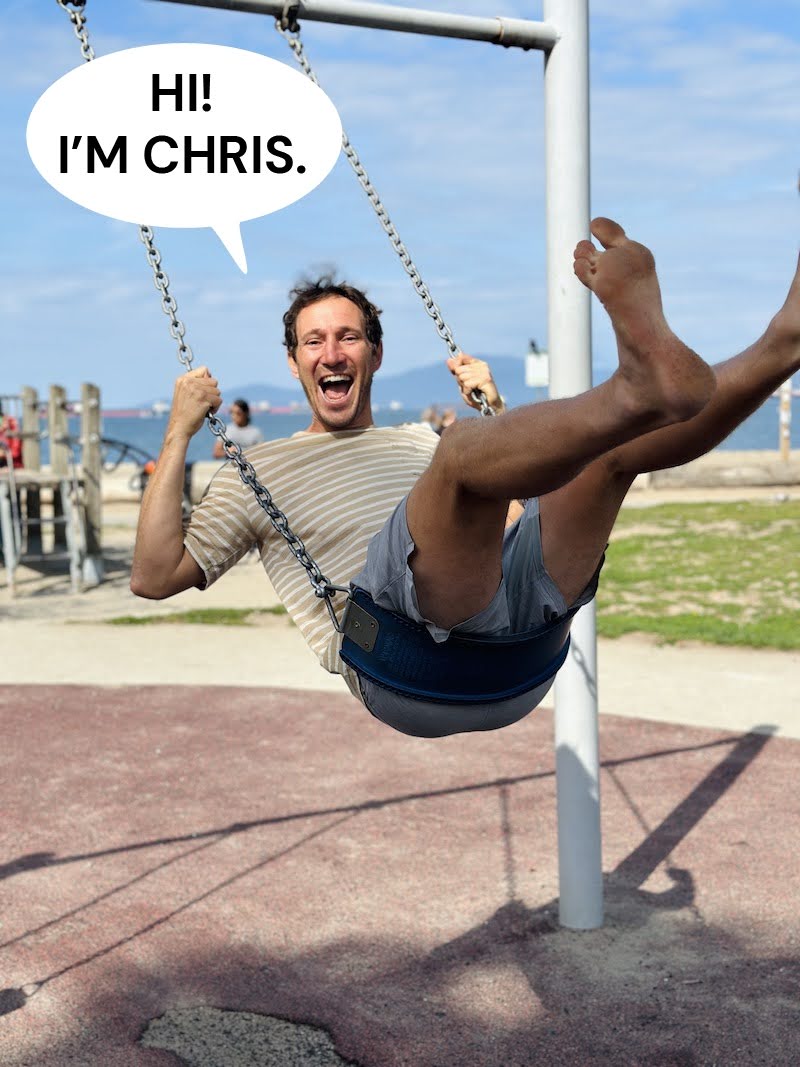I used to have the limiting belief that I’m unsocial.
Some people are born schmoozers, status seekers, and charismatic. Not me. “I am who I am,” I thought. So I mostly sat on the sidelines in the social game throughout high school, college, and my early professional years.
My unsociableness didn’t bother me much. If Travis didn’t invite me to the kegger he was throwing while his parents were out of town, that was his problem. By teenager standards, I was comfortable in my own skin.
But I shouldn’t have been.
True Potential… Or Delusion Bubble?
My limiting belief that I was unsocial gave me a misguided vision of what I was capable of.
I thought my potential was here:

But no. To use the model from my post on expanding your comfort zone, what I was looking toward was not my full potential but my delusion bubble:

I know this because, according to the Big 5 CANOE personality model, only a handful of traits remain relatively constant throughout adulthood:
- Extraversion
- Neuroticism
- Openness to experience
- Agreeableness
- Conscientiousness.
Ironically, unsociableness doesn’t fit in with this model. You can be introverted and social. Sociableness is a skill—and an belief.
Nothing about my personality destines me to be unsocial. While I may be introverted, I’m equally open, reasonably conscientious and agreeable, and not neurotic.
This means that my true potential is be bigger than my delusion bubble, something more like this:

But I held myself back by not seeing this.
Quit Hitting the Gas With Your Handbrake On
Occasionally, I’d have a bout of inspiration and fight my unsociableness.
I get invited to a party and gather up the willpower to act like a smiley, energetic, friendly, charismatic guy. But it felt inauthentic. And since I’m a crappy actor, I looked it. So not once did I wake up the next morning with a phone full of invites to do more cool stuff and go to more parties in the future.
Instead, I woke up exhausted from all the effort of faking it. And this reinforced my limiting belief that I’m not a social guy.
But that wasn’t my problem.
My real problem?
To use an analogy from Nobel-Prize-winning psychologist Daniel Kahneman, I was hammering on the accelerator with the handbrake on.
What Triggers Your Limiting Beliefs?
Limiting beliefs are handbrakes.
The problem is we have no flashing exclamation mark symbol on our mental dashboards to warn us when they’re engaged. Because of this, we grind through our lives, exerting unnecessary energy to go slower than we could. And out of our exhaust pipes spews a stinky stream of negative thoughts. This pollutes your life with poor choices, low self-esteem, and even depression.
Lucky for me, an unintended savior came to my rescue:
This blog.
To explain why, I need to let you in on a secret: I work on The Zag for the egotistical purpose of validating my self-worth by having others visit and benefit from my advice. And the funny thing about sharing advice is this:
It backfires—in a good way.
As I learned from Angela Duckworth, one of the best ways to give advice to someone is to have them advise someone else on that same topic. This motivates the advisor to not be a hypocrite and follow their own advice.
That’s what happened to me.
I my summary of one of my favorite sledgehammer books, Mindset, I passed on Carol Dweck’s advice for finding limiting beliefs with what she calls “fixed mindset triggers“:
- When do you feel overly anxious, incompetent, or defeated?
- When do you react defensively to criticism or feel angry or crushed em from feedback?
- What scenarios tend to bring up the strongest negative emotions in you?
- When do you make excuses?
- When do you feel envious or threatened by someone, rather than motivated by their success?
- When have you said, “I’m not very good at ______” or “I’m really good at ______”?
This motivated me to try these questions for myself:
- I feel anxiety, incompetent, or defeated… in group social situations.
- I make excuses… for not having a strong professional network because I’m unsocial.
- I’ve been known to say, “I’m not very good at… first impressions.”
And that’s when I finally noticed the handbrake light in my head.
Shift Your Focus for Easy Release
I’d already learned the hard way that willpower-ing my way past my limiting belief didn’t work.
So what could I do instead?
Clue #1
My first clue came via Maxwell Maltz’s Psycho-Cybernetics:
Willpower is not the answer. Self-image management is.
Maxwell Maltz
Aha! Change my self-image. Gotcha.
But hold on. My “unsocial-ness” had calcified over decades of delusion and self-justifying reinforcement. Releasing it couldn’t be as simple as grabbing it, pulling hard, and letting it loose.
That’s where the next clue came in.
Clue #2
I found clue number in James Clear’s book, Atomic Habits:
Every action you take is a vote for the type of person you wish to become.
James Clear
This made sense… in theory. But swinging my personal polls from “unsocial” to “social” would take a ton of votes. Wouldn’t such uncomfortable behavior require an oil tanker’s worth of willpower?
Only If I acted toward a self-image I didn’t believe in. But if I believed I had it in me, it wouldn’t be so hard.
So I discovered a workaround that’s easier than changing a limiting belief or creating a new one:
Find a belief in yourself you have that is inconsistent with your limiting belief. Then reinforce that quality through your actions.
This amounts to filling in the following blanks:
I don’t need to believe I’m ________ anymore. I will act more ________ instead.
In my case, I see myself as actively open-minded and a lifelong learner. And I believe I’m empathetic and want the best for other people. These qualities require minimal willpower to reinforce through my actions.
So I could reframe my approach to social situations:
Rather than pretend to be a super social butterfly, which I will never be, I can approach social situations as opportunities to practice my social skills and find ways to make the people I interact with feel good.
Doing so would loosen my handbrake.
You can see some of the work I’ve done so far on the blog. I’ve passed on advice about hosting dinner parties, being a better listener, and overcoming the charisma myth. And I’m acting on it.
The best part?
It doesn’t feel exhausting. It feels natural. It’s even kind of fun.
Unlimited Limiting Beliefs
If you were to meet me today, you’d realize within a matter of minutes that I still have a lot of work to do on my social skills.
Well screw you!
No, really, it’s fine.
Because now I believe my unsocial-ness isn’t a genetic defect. It’s a weakness that I can get rid of with practice.
And I have.
If you had met me years ago, then were to meet me again today, you’d see how far I’ve come. Yes, I’ve still got a long way to go. And I’ve got an untold number of other limiting beliefs to work on—pride, independence, and poor aesthetics, to name a few I’m aware of. But now that I’ve figured out how to find and release them, I don’t mind. It’s part of the journey. And with every handbrake I release, that ride gets smoother, faster, and more fun.
More Examples of Releasing Limiting Beliefs
Back in April 2021, 35 brave souls accompanied me on a “30-Day Redirect,” in which we went through a bunch of exercises to deflect our lives paths from this:

To this:

One quarter of this “redirect” involved finding and releasing a limiting belief.
Here are some examples of what others came up with:
- I don’t need to believe I’m bad at planning anymore. I will act more like a proactive leader instead. – Adrian
- I don’t need to believe I’m controlling anymore. I will act more like a risk-taker instead. – Jessee
- I don’t need to believe I’m difficult to like anymore. I will act more outgoing and adventurous instead. – Christine
- I don’t need to believe I’m too easily impressionable anymore. I will act more originally and focused instead. – Simon
- I don’t need to believe I’m a wimp anymore. I will act more action-oriented toward what I care about instead. – Tiffany
- I don’t need to believe I’m unfettered anymore. I will act more adaptable instead. – Jamie
- I don’t need to believe I’m directionless anymore. I will act more brave instead. – Dorothy
- I don’t need to believe I’m hard to get along with anymore. I will act more thought-provoking instead. – Maciej
- I don’t need to believe I’m high-strung anymore. I will act more calmly instead. (And use the Alexander Technique.) – Frances
And here are some of the most common limiting beliefs to look out for:
- I’m smart/stupid.
- I’m too old/young.
- I’m a perfectionist/disorganized.
- I’m too risk-averse.
- I’m a procrastinator/lazy/unmotivated.
- I’m damaged goods from negative childhood experiences.
- I’m not good enough.
- I’m too sensitive to criticism or failure.
What About You?
Let me know what handbrake you find and how you plan to release it in the comments or via email.
Here’s a suggestion:
- I don’t need to believe I’m the type of person who never responds to blog posts anymore. I will act more proactive and adventurous instead. – You
And for more inspiration to make life less of a slog, you might want to check these out:

"Feedback givers are architects of ideas and catalysts for change."
Can You Help Me?
I desperately need your feedback on The Zag because I'm struggling to improve it. Please leave your quick, 100% anonymous thoughts here.
About the author
👋 I'm Chris. Everything you read on TheZag.com is my fault. My life's work is to design unconventional systems that help people overcome complacency, social pressure, biases, and uncertainty (aka, 'The Suck') to engineer extraordinary lives that unleash their unique potential. Join my newsletter for fresh ideas every 10-ish days. Don't be boring.



Leave a Comment